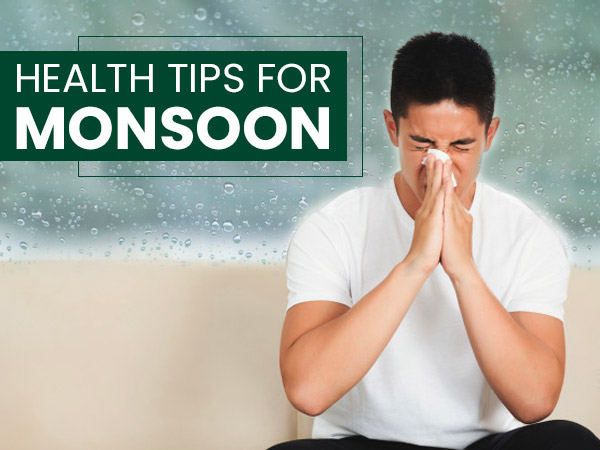The upcoming rainy season is a huge respite from the heat, but it does invite quite a few diseases. Maintaining a healthy lifestyle and diet just might keep the infections at bay.
As much as we would like monsoons to be only about cuddling with our favorite book and chai, the heavy downpour does not come without its health risks. Our bodies are much more susceptible to indigestion, infection, and allergies as our immunity decreases significantly during monsoons. Following a nutritional diet and maintaining sanitary practices around the house is key to stay fit and healthy during the monsoons. Here’s a look at what you can indulge in during the cozy season of the rains.
Do’s of Monsoon Diet

· Opt for seasonal fruits, such as litchi, Indian blackberry (Jamun), pomegranates, peach, and plum. While the seasonal fruits will impart the goodness of nature, non-seasonal fruits might be ripened through artificial techniques.
· Eat steamed salads instead of raw vegetables. Wash vegetables properly before steaming. Improper washing can lead to various bacterial and viral infections. Certain digestive conditions can also cause rise in levels of liver enzymes. Any such rise may indicate inflammation or damage to cells in the liver. Track your liver health with the help of a liver function test.
· Add desi Indian drinks such as Aam Panna, Sattu, Chach, in your daily diet. Refrain from sodas and cold drinks. They add calories with zero amount of other nutritional elements.
· Include herbal teas in your daily diet. Green teas and herbal teas are a rich source of antioxidants that helps prevent cell damage. Antioxidants are required for repair of skin, hair and other body cells.
· Go for fermented dairy products like yogurt and curd in place of ice creams. They aid in digestion and reduce bloating. As per Ayurvedic experts, the best time to have fermented dairy products like these can be after lunch. Some people might catch a cold and cough due to consuming curd at night.
Don’ts of Monsoon Diet

· Say strict no to roadside food or meals prepared with low hygiene. These can harbor infection-causing germs and hamper your gut health.
· Save that spread of samosa, kachori, and pakodas for only some special times. Fried foods may appear very tempting but the high oil content can interfere with the normal functioning of your digestive system, might slow the movements of digestive organs, and delay gastric emptying. These can further cause bloating and heartburn.
Eating food that has high content of fats, specifically saturated and trans fats, can cause a rise in cholesterol levels and raise your risk of several heart conditions. The first step to a healthier heart is to get your cholesterol and triglycerides levels checked periodically.
· Avoid salty foods or eat in moderation. Too much salt can cause fluid retention and uneasiness in the stomach. You need to take special care if you have been diagnosed with high blood pressure.
· Eating meals that are uncovered or prepared with dirty unwashed hands may spread many germs. Always cover your food to save it from being infected by flies. Wash hands with soap before preparing and eating every meal.
· Limit your intake of caffeinated drinks like tea and coffee. Too much of such beverages causes dehydration in the body. They can also interfere with the normal sleep pattern in some people, when consumed in late evening or nighttime.
· Dehydration can cause your body to lose important electrolytes. Electrolytes include salts and minerals, such as sodium, potassium, chloride and bicarbonate. An electrolyte imbalance can interfere with normal functioning of your body.
· Avoid eating seafood during the rainy season. It is very common for water bodies to be polluted with sewage, thus there are more chances of sea creatures being exposed to these pollutants. Also, monsoon is the breeding season for the fishes. You are not letting nature restock what you have been taking out. Most importantly, most fish sold in monsoon are pre-packaged or stored. Storing fish for longer periods can reduce its nutritional value.
· The last and yet the most important in the list is to not use contaminated water. Always ensure that your water should either be purified or boiled. Avoid Ice from non-distilled water, kulfis and golas to keep stomach upset and food poisoning at bay.
Healthy Lifestyle Tips

Besides healthy eating, a few health tips such as the following can lower your chances of being affected by a host of illnesses:
· Keep your house and the surroundings clean.
· Wash your hands with a hand wash before and after having a meal.
· Always carry a hand sanitizer along when you step out.
· Always wash the vegetables and fruits with clean, purified water before cooking or consuming them raw.
Following these healthy lifestyle tips can keep you healthy and safe during monsoons. Instead of binging on fast food and oily, greasy foods, make these nutritional, energy-giving foods a part of your lifestyle. Also, pay attention to good hygiene by taking preventive measures. Have a healthy and safe monsoon!
